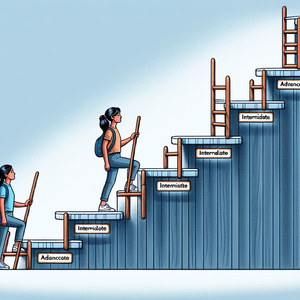From Zero to AI Hero: Success Stories of Entry-Level Engineers

The path to becoming an AI engineer is rarely linear. Many successful professionals come from backgrounds in humanities, education, biology, and even hospitality. For instance, Sarah, a former school teacher, always had a penchant for mathematics and problem-solving. Inspired by the potential of AI to improve educational outcomes, she decided to pivot her career. After enrolling in an online AI boot camp, she dedicated evenings and weekends to learning programming languages like Python and exploring machine learning concepts. Within a year, Sarah landed a position as a data analyst at an ed-tech startup, contributing valuable insights to the development of AI-driven educational tools. Similarly, Mike, who had spent years working in the culinary industry, found his way into AI engineering through a passion for data. Mike began to explore data analytics tools to better understand customer preferences in his restaurant. Intrigued by the power of data-driven decisions, he pursued online courses in data science and AI. His unique background in customer service provided him insights that were invaluable during his transition. Mike’s story culminated in a role as a junior AI engineer at a food tech company, where he now helps develop algorithms that predict food trends based on consumer behavior. His journey illustrates that even unconventional backgrounds can lead to successful careers in AI.
Overcoming Challenges
While the journeys to AI engineering are inspiring, they also involve significant challenges. Many newcomers face initial self-doubt and imposter syndrome. Take Emily, an artist turned AI engineer, who initially struggled with coding concepts. Despite her creative skills, she found the technical jargon daunting. To overcome this, she sought mentorship from a local tech group, where she connected with experienced AI professionals who shared their own struggles and provided guidance. Emily’s perseverance paid off; she now works on AI projects that combine her artistic vision with technology, developing tools for digital creators. Networking also plays a crucial role in breaking into the AI field. Rahul, who transitioned from a career in physics, emphasized the importance of building connections. He attended industry meetups, participated in hackathons, and used social media platforms like LinkedIn to engage with AI professionals. Through these avenues, he learned about job openings and even collaborated on projects that enhanced his portfolio. Eventually, he secured an entry-level position at a leading tech firm, where he continues to thrive. These examples highlight that while the path may be fraught with challenges, the right support and connections can make all the difference.
The Role of Continuous Learning
Another common thread in these success stories is the commitment to continuous learning. The field of AI is ever-changing, and staying updated with the latest technologies and methodologies is crucial. Many of the individuals interviewed for this article emphasized the value of online resources, such as Coursera, edX, and specialized AI forums. They regularly engage in self-study and participate in online challenges to sharpen their skills. This proactive approach not only bolsters their resumes but also fosters a mindset of lifelong learning that is essential in the tech world. For example, Sarah continues to expand her knowledge in AI by participating in webinars and online workshops, ensuring she remains competitive in an ever-evolving job market. Mike has taken to contributing to open-source projects, which not only enhances his skills but also showcases his capabilities to potential employers. This emphasis on continuous learning is vital for anyone looking to succeed in the competitive field of AI engineering.
The inspiring journeys of Sarah, Mike, Emily, and Rahul serve as powerful reminders that diverse backgrounds can lead to success in AI engineering. Their stories underscore the significance of perseverance, networking, mentorship, and continuous learning. For those who aspire to break into this exciting field, these real-life examples demonstrate that it is possible to transition into AI engineering, regardless of one’s starting point. With determination, resourcefulness, and the right strategies, anyone can embark on their journey from zero to AI hero. As the demand for entry-level AI engineer jobs continues to grow, the future of AI engineering is bright, and those willing to take the leap will find themselves at the forefront of innovation and technology.
Data Analyst in Educational Technology
EdTech startups, educational institutions, technology companies focused on learning solutions
Core Responsibilities
Analyze educational data to identify trends and insights that inform product development.
Collaborate with cross-functional teams to create AI-driven tools for enhanced learning experiences.
Prepare reports and visualizations to communicate findings to stakeholders.
Required Skills
Proficiency in data analytics tools such as SQL, Python, or R.
Strong communication skills to present technical information to non-technical audiences.
Experience with data visualization software (e.g., Tableau, Power BI) is a plus.
Junior AI Engineer in Food Technology
Food tech companies, restaurants investing in technology, consumer goods firms
Core Responsibilities
Assist in the development and testing of machine learning algorithms to analyze consumer behavior.
Work alongside senior engineers to optimize models for predictive analytics in food trends.
Conduct data cleaning and preprocessing to ensure high-quality datasets for model training.
Required Skills
Familiarity with programming languages such as Python and libraries like TensorFlow or PyTorch.
Understanding of machine learning concepts and algorithms.
Background in data analytics or statistics is advantageous.
AI Project Coordinator
Tech companies, consulting firms, startups focused on AI solutions
Core Responsibilities
Coordinate project timelines, resources, and deliverables for AI initiatives across teams.
Facilitate communication between technical teams and stakeholders to ensure alignment on project goals.
Monitor project progress and make adjustments to timelines as needed.
Required Skills
Strong organizational and project management skills, with experience using tools like Asana or Trello.
Understanding of AI concepts to effectively communicate with technical teams.
Experience in a similar coordinator or administrative role is beneficial.
AI Solutions Consultant
Consulting firms, technology providers, enterprise software companies
Core Responsibilities
Analyze client needs and recommend AI solutions to enhance business processes.
Conduct workshops to educate clients on AI technology and its applications.
Collaborate with engineering teams to customize AI products for specific client requirements.
Required Skills
Strong analytical skills and the ability to translate technical concepts into business benefits.
Excellent interpersonal and communication skills to engage with clients effectively.
Experience in consulting or customer-facing roles is preferred.
Machine Learning Intern
Tech startups, research institutions, companies with dedicated AI divisions
Core Responsibilities
Support senior machine learning engineers in developing, training, and testing models.
Assist in data collection and preprocessing for model development.
Participate in code reviews and contribute to documentation for projects.
Required Skills
Basic knowledge of machine learning and experience with Python programming.
Familiarity with data manipulation libraries (e.g., Pandas, NumPy).
Enthusiasm for learning and a desire to grow in the field of AI.


